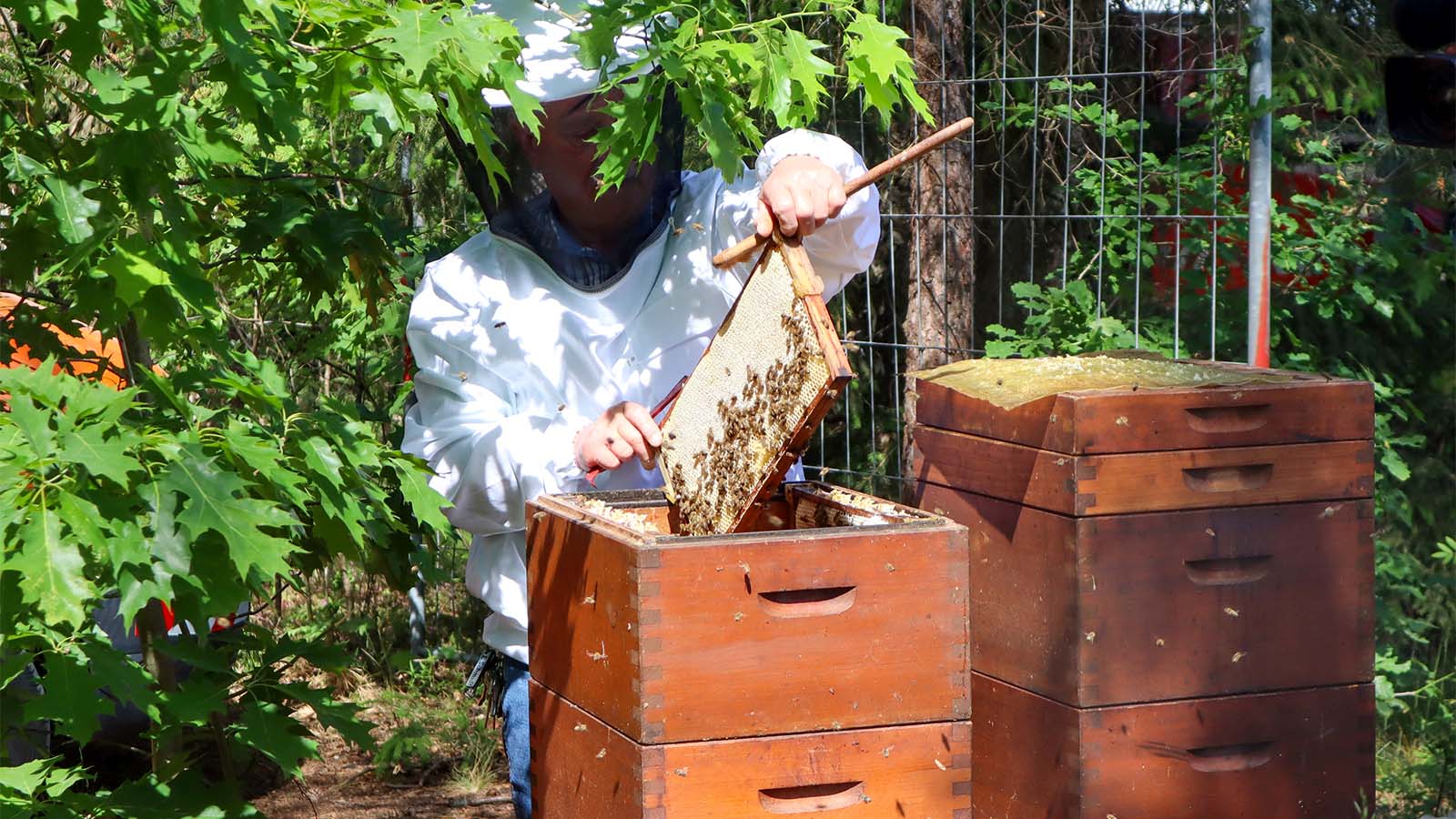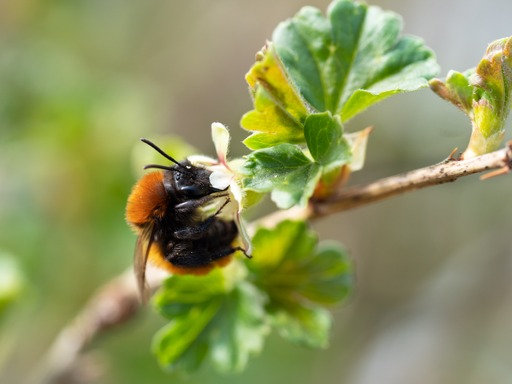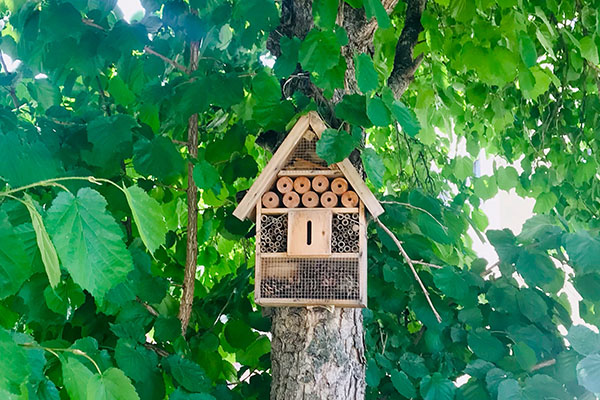How to keep the buzzing bees alive
Anyone who leaves the house early in the morning has long since noticed: summer is in the starting blocks. Bees are already humming and buzzing loudly on balconies and terraces, in gardens and meadows. Unfortunately, our environment’s nature and biodiversity are under significant threat!
The United Nations General Assembly proclaimed 20th May as World Bee Day for the first time in 2018. The intention is to draw awareness to the fact that bee populations are declining massively worldwide and therefore urgently need protection. Although most people are aware that bees are pollinators and play a vital role in the food chain there are still some misunderstandings, especially regarding which bee species are under threat. Contrary to popular belief, it’s not honey bees but primarily wild bees that are acutely endangered. According to the Bavarian State Research Centre for Agriculture (LfL), 580 different species of wild bees live in Germany alone, and 520 of which are present in Bavaria. That sounds good at first, doesn’t it? However, the bad news is that the black and yellow buzzers are threatened with extinction by our intensive agricultural methods and increasing urbanisation. The good news—everyone can make a contribution through their behaviour and help protect the hard-working bees, especially our native wild bees.
Measures taken by the city of Nuremberg for more biodiversity
For many years the City of Nuremberg has been implementing measures to promote insect abundance by preserving habitats and creating livelihoods. This includes mowing many meadows just once a year, maintaining a natural environment for bees and other insects. Some areas of roadside greenery are only mowed twice a year, for example, Erlanger Strasse and Münchener Strasse. Lush flowering perennial beds have also been created, including the raised beds on Fürther Strasse and the newly planted beds on Europaplatz, as well as planting flower bulbs that bloom in early spring that are frequented by bees. Attention is also paid to planting a mixture of different tree species for roadside greenery. This increases biodiversity and offers insects and bees a basis for life.
Biodiversity is also important at Nuremberg Airport—colonies of bees have been settled on the airport grounds since 2003. The airport bees have the important task of helping to check whether air traffic is affecting the air quality around the airport. Samples of the collected pollen and the airport honey obtained from it are laboratory tested. The present laboratory results confirm the environmentally-conscious traffic concept and the forward-looking planning: All previous findings were well below the legal limits. In addition, the airport honey is quality tested by the Bavarian State Institute for Viticulture and Horticulture. So far, it has been classified as high-quality and particularly species-rich honey.
Only a tiny amount of honey is required for analysis. The rest of the airport honey is filled into jars and given away on special occasions. The airport’s environmental department and employees passionate about beekeeping in their private lives are responsible for the nurturing and care of the airport bee colonies.
If you want to do something to help bees, bumblebees, and other insects, here are five suggestions that are easily integrated into daily life and will help ensure that the hum and buzz doesn’t stop.
5 easy ways to become a beekeeper
- Just like us humans, bees need a balanced and rich diet. To find food, bees seek out flowering plants. Instead of an English lawn, a colourful flower meadow can provide bees with pollen from spring to autumn. Creating a species-rich flowering area with native plants and flowers on the balcony or in the small backyard is now child’s play. Bee-friendly flowering mixtures and seeds can be found just about everywhere. Particularly suitable are, among others: dahlias, bellflowers, daisies, dandelions, sunflowers, as well as basil, lavender and sage, thyme, and parsley.
- Wild bees also need holes in branches or cavities in the ground to build nests. Broken and rotting branches are particularly suitable tree cavities. But a dense pile of leaves is also ideal as a cosy winter home not only for hedgehogs but also for bees.
- Bee hotel: Bumblebees and other insects are happy to have a suitable retreat in which to nest. An insect hotel or bumblebee house can be erected in a garden or on a balcony. When setting it up, the most important aspects are the location and the compass direction, which needs to be sunny and dry—a south-facing house wall is ideal. In general, when buying a bee hotel, you should make sure that all materials are natural. If you are a skilled craftsman, using suitable materials you can build your own insect hotel.
- Insect drinking trough: Whether honey bees or wild bees, all representatives of these species need a constantly filled water source. Especially when temperatures rise in summer, it is not only people who look for a place to cool down. Bumblebees, bees and the like are also dependent on cool water. A small shallow bowl filled with water is sufficient. Small stones or wooden bark sticking out of the water in the bowl help the animals land. If you decide to buy an insect hotel, don’t forget an insect drinking trough.
- Buy Franconian honey: The last tip is simple, healthy, and delicious. In order to support the well-being of local bees and nature, it is best to buy honey from regional beekeepers. Buying high-quality regional honey from Franconian is now simple. In the Burgviertel, on the roof of the Neues Museum and in Mögeldorf and Zerzabelshof, various professional and amateur beekeepers have set up shops offering fresh honey or other honey products for sale. Honey production has a long tradition in the Nuremberg Metropolitan Region. As early as the Middle Ages, so-called “Zeidler” (Middle High German word for beekeepers) collected the honey of wild or semi-wild bees in the forests around Nuremberg.
I hope this article buzzed your interest in environmental protection and species conservation. If you liked the article, I would be happy to receive your suggestions and comments. With this in mind, I wish you all a happy “World Bee Day” and a buzzing summer.



















